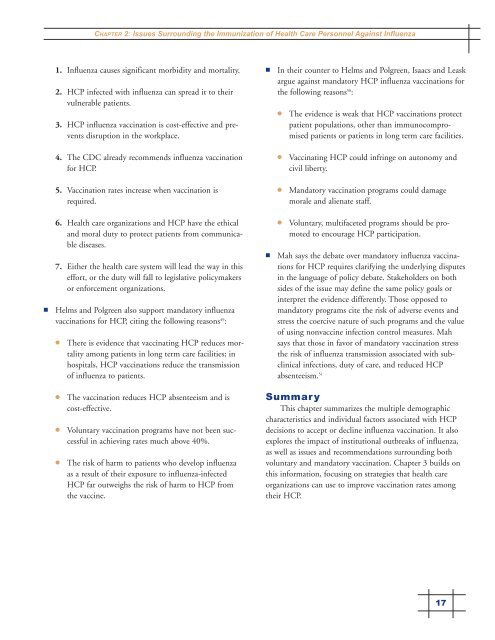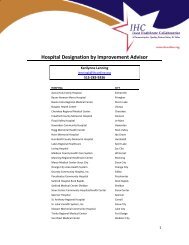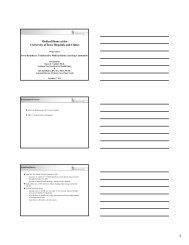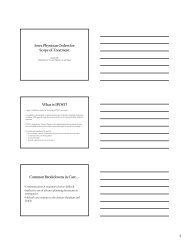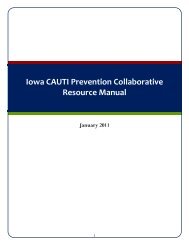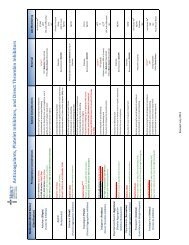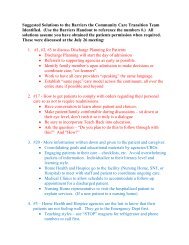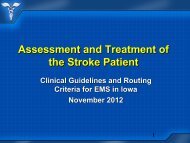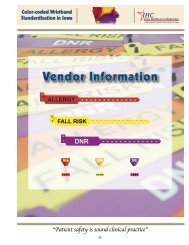Providing a Safer Environment for Health Care Personnel & Patients ...
Providing a Safer Environment for Health Care Personnel & Patients ...
Providing a Safer Environment for Health Care Personnel & Patients ...
Create successful ePaper yourself
Turn your PDF publications into a flip-book with our unique Google optimized e-Paper software.
CHAPTER 2: Issues Surrounding the Immunization of <strong>Health</strong> <strong>Care</strong> <strong>Personnel</strong> Against Influenza<br />
1. Influenza causes significant morbidity and mortality.<br />
2. HCP infected with influenza can spread it to their<br />
vulnerable patients.<br />
3. HCP influenza vaccination is cost-effective and prevents<br />
disruption in the workplace.<br />
■<br />
In their counter to Helms and Polgreen, Isaacs and Leask<br />
argue against mandatory HCP influenza vaccinations <strong>for</strong><br />
the following reasons 50 :<br />
●<br />
The evidence is weak that HCP vaccinations protect<br />
patient populations, other than immunocompromised<br />
patients or patients in long term care facilities.<br />
4. The CDC already recommends influenza vaccination<br />
<strong>for</strong> HCP.<br />
5. Vaccination rates increase when vaccination is<br />
required.<br />
●<br />
●<br />
Vaccinating HCP could infringe on autonomy and<br />
civil liberty.<br />
Mandatory vaccination programs could damage<br />
morale and alienate staff.<br />
■<br />
6. <strong>Health</strong> care organizations and HCP have the ethical<br />
and moral duty to protect patients from communicable<br />
diseases.<br />
7. Either the health care system will lead the way in this<br />
ef<strong>for</strong>t, or the duty will fall to legislative policymakers<br />
or en<strong>for</strong>cement organizations.<br />
Helms and Polgreen also support mandatory influenza<br />
vaccinations <strong>for</strong> HCP, citing the following reasons 49 :<br />
●<br />
There is evidence that vaccinating HCP reduces mortality<br />
among patients in long term care facilities; in<br />
hospitals, HCP vaccinations reduce the transmission<br />
of influenza to patients.<br />
■<br />
●<br />
Voluntary, multifaceted programs should be promoted<br />
to encourage HCP participation.<br />
Mah says the debate over mandatory influenza vaccinations<br />
<strong>for</strong> HCP requires clarifying the underlying disputes<br />
in the language of policy debate. Stakeholders on both<br />
sides of the issue may define the same policy goals or<br />
interpret the evidence differently. Those opposed to<br />
mandatory programs cite the risk of adverse events and<br />
stress the coercive nature of such programs and the value<br />
of using nonvaccine infection control measures. Mah<br />
says that those in favor of mandatory vaccination stress<br />
the risk of influenza transmission associated with subclinical<br />
infections, duty of care, and reduced HCP<br />
absenteeism. 51<br />
●<br />
●<br />
●<br />
The vaccination reduces HCP absenteeism and is<br />
cost-effective.<br />
Voluntary vaccination programs have not been successful<br />
in achieving rates much above 40%.<br />
The risk of harm to patients who develop influenza<br />
as a result of their exposure to influenza-infected<br />
HCP far outweighs the risk of harm to HCP from<br />
the vaccine.<br />
Summary<br />
This chapter summarizes the multiple demographic<br />
characteristics and individual factors associated with HCP<br />
decisions to accept or decline influenza vaccination. It also<br />
explores the impact of institutional outbreaks of influenza,<br />
as well as issues and recommendations surrounding both<br />
voluntary and mandatory vaccination. Chapter 3 builds on<br />
this in<strong>for</strong>mation, focusing on strategies that health care<br />
organizations can use to improve vaccination rates among<br />
their HCP.<br />
17


